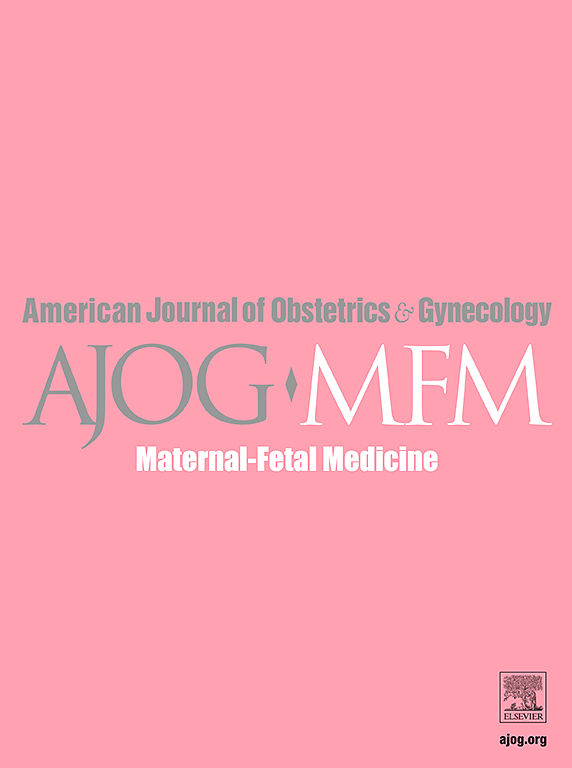Nonsevere hypertensive disorders of pregnancy and oral antihypertensive medications: an argument against use
IF 3.8
2区 医学
Q1 OBSTETRICS & GYNECOLOGY
American Journal of Obstetrics & Gynecology Mfm
Pub Date : 2025-03-01
DOI:10.1016/j.ajogmf.2024.101560
引用次数: 0
Abstract
Hypertensive disorders of pregnancy, including gestational hypertension and preeclampsia, affect approximately 13% of all pregnancies and are a major cause of maternal and neonatal morbidity and mortality worldwide. Although the treatment of preeclampsia with severe features has been well established on the basis of randomized controlled data, international society guidelines vary on the treatment of gestational hypertension and preeclampsia without severe features. The American College of Obstetricians and Gynecologists recommends against the use of antihypertensive agents for nonsevere hypertension (blood pressure of <160/110 mm Hg) in both gestational hypertension and preeclampsia without severe features given a lack of level 1 evidence in support of treatment and the theoretical risk of masking of disease progression or causing adverse fetal effects, such as growth restriction. However, with the publication of the Chronic Hypertension in Pregnancy trial, (CHAP) which demonstrated the benefit of treatment of nonsevere chronic hypertension, “indication creep” or the application of a treatment outside the population of proven benefit is being observed with the use of antihypertensive medication for the treatment of nonsevere hypertension in gestational hypertension and preeclampsia without severe features. The use of antihypertensive treatment in this population without a definitive trial and no clearly defined safety protocols is potentially dangerous and could, at worst, lead to maternal and fetal harm or, at best, provide benefit in ways that are hard to assess and, thus, interfere with efforts to generate definitive evidence to change practice guidelines, denying many pregnant patients optimal care. It is imperative that a definitive trial be performed performed prior to the widespread use of antihypertensive treatment for gestational hypertension or preeclampsia without severe features.
非严重妊娠高血压疾病与口服降压药:反对使用的论据。
妊娠期高血压疾病,包括妊娠期高血压和子痫前期,占所有妊娠的 13%以上,是全球孕产妇和新生儿发病率和死亡率的主要原因。虽然根据随机对照数据,治疗有严重特征的子痫前期的方法已经非常成熟,但对于治疗妊娠高血压和无严重特征的子痫前期,国际社会的指南却各不相同。美国妇产科医师学会(ACOG)建议,对于非重度高血压(血压低于正常值),不要使用降压药物。
本文章由计算机程序翻译,如有差异,请以英文原文为准。
求助全文
约1分钟内获得全文
求助全文
来源期刊

American Journal of Obstetrics & Gynecology Mfm
Medicine-Medicine (all)
CiteScore
7.40
自引率
3.20%
发文量
254
审稿时长
40 days
期刊介绍:
The American Journal of Obstetrics and Gynecology (AJOG) is a highly esteemed publication with two companion titles. One of these is the American Journal of Obstetrics and Gynecology Maternal-Fetal Medicine (AJOG MFM), which is dedicated to the latest research in the field of maternal-fetal medicine, specifically concerning high-risk pregnancies. The journal encompasses a wide range of topics, including:
Maternal Complications: It addresses significant studies that have the potential to change clinical practice regarding complications faced by pregnant women.
Fetal Complications: The journal covers prenatal diagnosis, ultrasound, and genetic issues related to the fetus, providing insights into the management and care of fetal health.
Prenatal Care: It discusses the best practices in prenatal care to ensure the health and well-being of both the mother and the unborn child.
Intrapartum Care: It provides guidance on the care provided during the childbirth process, which is critical for the safety of both mother and baby.
Postpartum Issues: The journal also tackles issues that arise after childbirth, focusing on the postpartum period and its implications for maternal health. AJOG MFM serves as a reliable forum for peer-reviewed research, with a preference for randomized trials and meta-analyses. The goal is to equip researchers and clinicians with the most current information and evidence-based strategies to effectively manage high-risk pregnancies and to provide the best possible care for mothers and their unborn children.
 求助内容:
求助内容: 应助结果提醒方式:
应助结果提醒方式:


